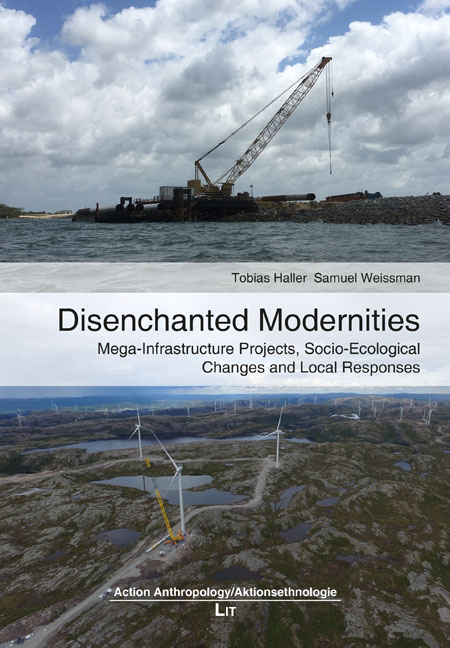Book Launch - Disenchanted Modernities. XIX Biennial IASC Conference - Nairobi
Book Launch – University of Nairobi – June 20 – 18.00
XIX Biennial IASC Conference
‘The Commons We Want: IASC 2023. Nairobi, Kenya, June 19-24
Mega-Infrastructure Projects (MIPs) represent a central element of globalized development. MIPs like the Chinese driven `Belt and Road Initiative’ (BRI) include large-scale agrarian, road, rail, port and energy networks. They are complex ventures involving international capital and multiple stakeholders. `Disenchanted Modernities’ presents 16 case studies showing that the promise of a sustainable modern development by MIPs leave many local users disenchanted: They don’t profit form the MIPs but lose access to their resources often held in common. The book describes the strategies of states and companies as well as local responses to MIPs in Asia, Africa, Americas and Europe.
Tobias Haller is Extraordinary Professor in Social Anthropology at the Institute of Social Anthropology,
University of Bern, Switzerland and lecturer at the ETH Zurich, Switzerland.
Samuel Weissman is a researcher at the Institute of Social Anthropology, University of Bern, Switzerland.
Table of Contents
1. Imposing the New Silk Road in a Contested Nation: The China-Pakistan Economic Corridor, Belochistan Province (Yuri Forster)
2. On the Margins of the Belt and Road. Commons Grabbing and Environmental Degradation on the Tibetan Plateau ( Tenzin Dawa Kongpo and Stephy-Mathew Moozhiyil)
3. The Disenchantment of Mining and its Politics Machine: a Cautionary Tale from Mongolia (Troy Sternberg)
4. From Enchantment of Development to Disenchantment of Water Grabbing: the Deli-Mumbai Industrial Corridor in Rajasthan, India (Marco Grogg)
5. Smart Cities, Smart Land Grabbing and Legal Pluralism: An MIP Case from Gujarat, India (Oliver Stettler)
6. Unfulfilled Promises and Impacts of a Green Energy Enchantment: The Benban Solar Park in Egypt (Anja Furger)
7. Manoeuvring Enchantment of Mega-Infrastructure Projects in Northern Kenya: LAPSSET and the Crude Oil in Turkana County ( Benard Musembi Kilaka, Elisabeth Schubiger)
8. Fishing in Troubled Waters: the impacts of LAPSSET on the local fisheries in Lamu, Kenya (Flurina Werthmüller)
9. “Whose Growth, Whose Loss?” The ‘Southern Agricultural Growth Corridor of Tanzania’ (SAGCOT) and Impacts on Smallholders in Iringa District (Sandro Fiechter, Felix Gallauer Alves de Souza, Désirée Gmür, Belinda Bösch)
10. ‘Dam(n)ing the Kuene River? Namibian Dam Resistance across Space and Time (Richard Meissner)
11. Small Project – Big Disaster: Large-Scale Problems within the Small-Scale Hydropower Project ‘San José del Tambo’ in Ecuador (Hannah Plüss)
12. From Enchanted Alienation to Transformative Responses: Agro-industrial MIPs and Local Reactions towards Reproduction of Life in Bolivia (Aymara Llanque, Marta Irene Mamani, Johanna Jacobi, Anja Furger)
13. When the Black Snake Crosses Sacred Land: The Dakota Access Pipeline and the Ontology of Protest in North Dakota, USA (Anna Katharina Vokinger)
14. Storheia Wind Farm, Fosen Peninsula, Norway, Europe. Fighting against Windmills: Contested Knowledge, Resilience Grabbing and the Feeling of History repeating itself in Storheia, Norway (Bettina Wyler)
15. Pipelines, Flows and Roots: Power Struggles Over the Trans Adriatic Pipeline in Southern Italy (Antonio Maria Pusceddu)
16.Walk to Resist: Contesting a Large-Scale Road Project in the City of Biel, Switzerland (Lucien Schönenberg)
17. From Enchantment to Disenchantment and the new participatory politics of infrastructure development:
-
ab 54,90 €
Tobias Haller, Samuel Weissman
Mega-Infrastructure Projects, Socio-Ecological Changes and Local Responses
ISBN 978-3-643-80378-8 Band-Nr. 3 Jahr 2024 Seiten 492 Bindung broschiert Reihe Action Anthropology/Aktionsethnologie 
Disenchanted Modernities
ISBN: 978-3-643-80378-8 ab 54,90 €und inkl. Versand (D, A, CH)
Ausführung wählen Dieses Produkt weist mehrere Varianten auf. Die Optionen können auf der Produktseite gewählt werdenQuick View

